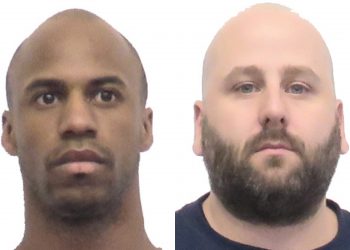DES MOINES, Iowa – On Monday afternoon, the Iowa House Judiciary Committee voted 16 to 5 to advance HF 889. The legislation prohibits state and local governments from requiring a COVID-19 vaccination card and will deny state grants and contracts to businesses that require proof of receiving the COVID-19 vaccine.
“Business” is defined in the bill as a retailer that is required to obtain a sales tax permit and non-profit organizations and establishments that are open to the public or where a cover charge or membership requirement limits entrance.
Health care facilities are exempted from the bill, and several members of the public who were able to speak during the “subcommittee of the whole” (instances where the entire committee acts as a subcommittee due to schedule constraints) were unhappy about the exemption.
Bree Johnson, representing Informed Choice of Iowa, said they supported the bill with an amendment.
“I had high hopes for swift legislation encompassing protections of our freedoms to move through the legislative process. And so you can imagine the somewhat disappointment of myself and the members that I represent, for me to be standing here now needing to also fight legalized discrimination that appears to be wrapped up into a bill that should warrant nothing but applause from our organization,” she said.
“What this would look like in application is gravely concerning since it has the potential to open this up for nursing homes, doctors offices, or hospice facilities to make it mandatory to be a patient, resident, visitor, or employee of these facilities,” Johnson added.
She reminded the committee that the vaccine had not been proven to stop transmission of COVID-19 or fully approved by the Food and Drug Administration. Johnson added that the vaccine is still in phase 3 of testing until 2023.
Another Iowan, Shelley Pentico, identified herself as a travel agent said that a “vaccination passport” would hurt the tourism industry in Iowa and in the United States.
Bethany Niemeyer of Cedar Rapids also opposed the exemption.
“We need protection from vaccine mandates at every level, not just at the government level. I do not want anything to do with an incredibly experimental vaccine for me, especially being 19 weeks pregnant,” she said. Neimeyer noted that discrimination is already happening. She has to drive two hours to find a medical care provider who will see her son, whose vaccinations are not up to date due to a medical condition, even with a medical exemption.
Jessica Pennings from Ankeny said she and her child have been injured by a vaccine said she supports the bill with an amendment that would remove the healthcare facility exemption.
“This isn’t about vaccines. This is the human rights issue. These passports will greatly endanger my life and my ability to provide for my family, and I will never be coerced into defiling my body with an experimental product that contains ingredients I’m allergic to a nanoparticle technology that has never been used on humans. These passports are a violation of privacy. They are discriminatory, and businesses, employers, healthcare facilities, pharmaceutical corporations, the government, or any of you determining the fate of this bill are liable if this product kills me or hurts me,” she asserted.
J.D. Davis with the Iowa Association of Business and Industry said they could support a bill that ensures vaccine passports are not limited in Iowa. Still, their members had questions about implementing the bill, such as if an employee’s job required international travel or if businesses could do other types of screening.
Ashley Lin, a registered nurse, said that she is very concerned about the bill without amendments. She discussed how patients were denied visitors during the pandemic and how difficult that was for health care staff to enforce. She also pointed out that China has urged the World Health Organization since March to allow Beijing to build and run a global database for vaccine passports and internationalize Chinese standards.
Terry Amman, the pastor of Church of the Way in Des Moines, said he supported the bill out of concern about how vaccine mandates and passports violate people’s privacy and right to determine whether they will be vaccinated.
State Rep. Jeff Shipley, R-Birmingham, who does not serve on the House Judiciary Committee, provided comments during the subcommittee hearing. He was also concerned about the exemption and said it contradicted Gov. Kim Reynolds’ statement opposing COVID-19 ‘vaccine passports.’
“This bill would allow an institutionalized vaccine passport system of medical discrimination to take hold. So I think that is a very significant problem with this bill, that to me does represent a step backward when it comes to medical freedom,” he said.
State Senator Jim Carlin, R-Sioux City, said he supports the bill and has reservations about the exemption. “Those visitors, residents, doctors, and nurses would seriously being coerced into forced compliance, that would affect their bodily autonomy and their privacy,” he said.
“Vaccine passports are incredibly coercive. It would be an incredibly coercive tool of the government to be able to tell you where and how you can travel, where you can work. There’s a lot of potential for great evil here that really needs to be considered as it relates to the threat to freedom that it existentially presents to us today,” Carlin added.
Nicole Proesch with the Iowa Hospital Association said her organization is fine with the bill as it is currently written but would oppose an amendment to the bill removing the exemption.
“Iowa’s hospitals and hospital staff have put everything on the line to keep their communities safe and did all they could to bring normalcy during the pandemic to follow applicable regulations. Hospitals have done their best during enduring circumstances. Hospitals had to make decisions about the right care based on the unique circumstances of each patient. Hospitals also need to understand medical history, including current medications and vaccines. We need to understand and be able to know the patient’s history,” she said.
Proesch said removing the exemption would negatively impact hospitals in caring for their patients and continuing to work toward ending the pandemic.
Heather Stancil, a Madison County Supervisor, said she supports the bill with amendments stating that she has already been denied care due to not wearing a mask for medical and religious reasons. She noted that healthcare facilities make accommodations already under various federal laws.
The bill had bipartisan support among the committee members.
State Rep. Cherielynn Westrich, R-Ottumwa, said she planned to vote the bill out of committee but looked forward to discussing amendments to the bill. She had concerns with some of the bill’s language but wanted to see it move forward.
State Rep. Mary Wolfe, D-Clinton, said she was disappointed that some of the speakers framed the issue in partisan terms.
“I can assure you that House Democrats have been standing up and pushing back against bills that seek to restrict bodily autonomy and privacy for many years now. So that is not a partisan issue,” she said.
Wolfe acknowledged the bill wasn’t perfect but still recommended a yes vote.
State Rep. Steven Hansen, D-Sioux City, said he would vote for the bill due to the concerns articulated by those who oppose vaccine passports even though he does not share those views.
He said he hadn’t seen anything like a vaccine passport but supposed he had one since he had a COVID-19 vaccination record.
“I don’t understand why vaccines have become a partisan issue. It was a personal thing that I can understand. And when I read your emails and I listened to your concerns, I have empathy for your fears. I have empathy for your concerns. I don’t have to share them,” Hansen said.
He articulated his disagreement with mask and vaccine opposition stating he believed the pandemic would have been worse without them.
State Rep. Christina Bohannan, D-Iowa City, said she supports the bill as it is written.
“I don’t think that people should be forced to get a vaccination, particularly when something is still under emergency use authorization. So I will support the bill. I don’t support a lot of the amendments that I’ve heard about, but I do support the bill,” she said.
Bohannan also took the opportunity to correct what some speakers said about the VAERS (Vaccine Adverse Event Reporting System) database maintained by the Centers for Disease Control and Prevention.
“I heard at least I think two speakers talk about how the vaccine has caused a lot of deaths and cited the VAERS database for that information. That is not true. And I think it’s really important to say that it’s not true because it affects whether people get the vaccine or not. The CDC has reviewed all of that information. And it said that based on all of the available clinical information, including death certificates, autopsy medical records, and all other evidence, there is no evidence that the vaccine contributed to patient deaths,” she stated.
State Rep. Sandy Salmon, R-Janesville, spoke in favor of the bill.
“Our freedoms in the bill of rights are God-given and not dependent upon obeying government or private mandates. If we have to obey government or private mandates to be given our freedoms, then they’d have been reduced to being only privileges. And government has abdicated its job to protect those freedoms from violation by itself or private businesses. It’s government’s job to protect those freedoms, and with this bill, we are doing our job. And there’s more to be done and we will continue to work on that,” she said.
State Rep. Jon Jacobsen, R-Council Bluffs, offered an amendment that expanded the prohibition in the bill to businesses, not just state and local government. He debated that workers need to be protected from employer mandates noting that federal law requires employers to make different accommodations for employees. Jacobsen believed the language in the current bill would violate federal law. It did not address exemptions for health care facilities.
“Right now, my constituents are terrified that they will be terminated or will not be able to get employment,” he said. “There’s a giant plank a two by four, wielding like a big bad stick on some of our working people, nonpartisan folks, these were labor union people talking to me, as well as a small business corporate employees. But if we cross a certain line here, we’re essentially relegating these people into serfdom and involuntary servitude, by the absolute meanings of those words.”
State Rep. Steven Holt, R-Denison, who managed the bill in committee, said they might consider the amendment for the floor but was concerned about the legislative session coming to a close and disagreement between the House and Senate could result in no bill being passed.
The amendment failed in a voice vote.
Holt, in his closing remarks, spoke about the necessity of the bill.
“This is an issue that is deeply concerning to a number of Iowans, and I do think it crosses party lines. I don’t think it’s a partisan issue. I think vaccine passports are unAmerican. I think they’re unconstitutional, and I think they’re unacceptable. No, Iowans should be forced to get a vaccine in order to participate in normal life and exercise their most fundamental God-given rights. No Iowan should be forced to have a chemical injected into their body against their will in order to be able to go to a grocery store, attend to baseball game or a movie, or travel freely in our state in our country. At the very core of our beliefs as Americans is the right of free men and women to live their lives as they see fit,” he said.
Holt acknowledged that the bill does not address every concern but did not want to see “perfect become the enemy of good.”
“We may not get everything done in this legislation. We can always come back and fight for more. As Ronald Reagan often said, we can get 80 percent of what we want, come back later, and fight for 20 percent that we didn’t get,” he said.
Holt acknowledged the challenges they face since the rights of employees and the rights of businesses might conflict.
“If a business chooses to mandate any sort of a vaccination requirement before entry into their business, they would not be eligible for state grants or contracts going forward. That would be the decision that business would have to make. We think that’s a pretty strong statement. We also know that particularly with big businesses, they don’t want to be seen as disobeying the law. So I think this is pretty strong language to take care of that particular situation,” he said.
Listen to the subcommittee hearing and committee debate below:















